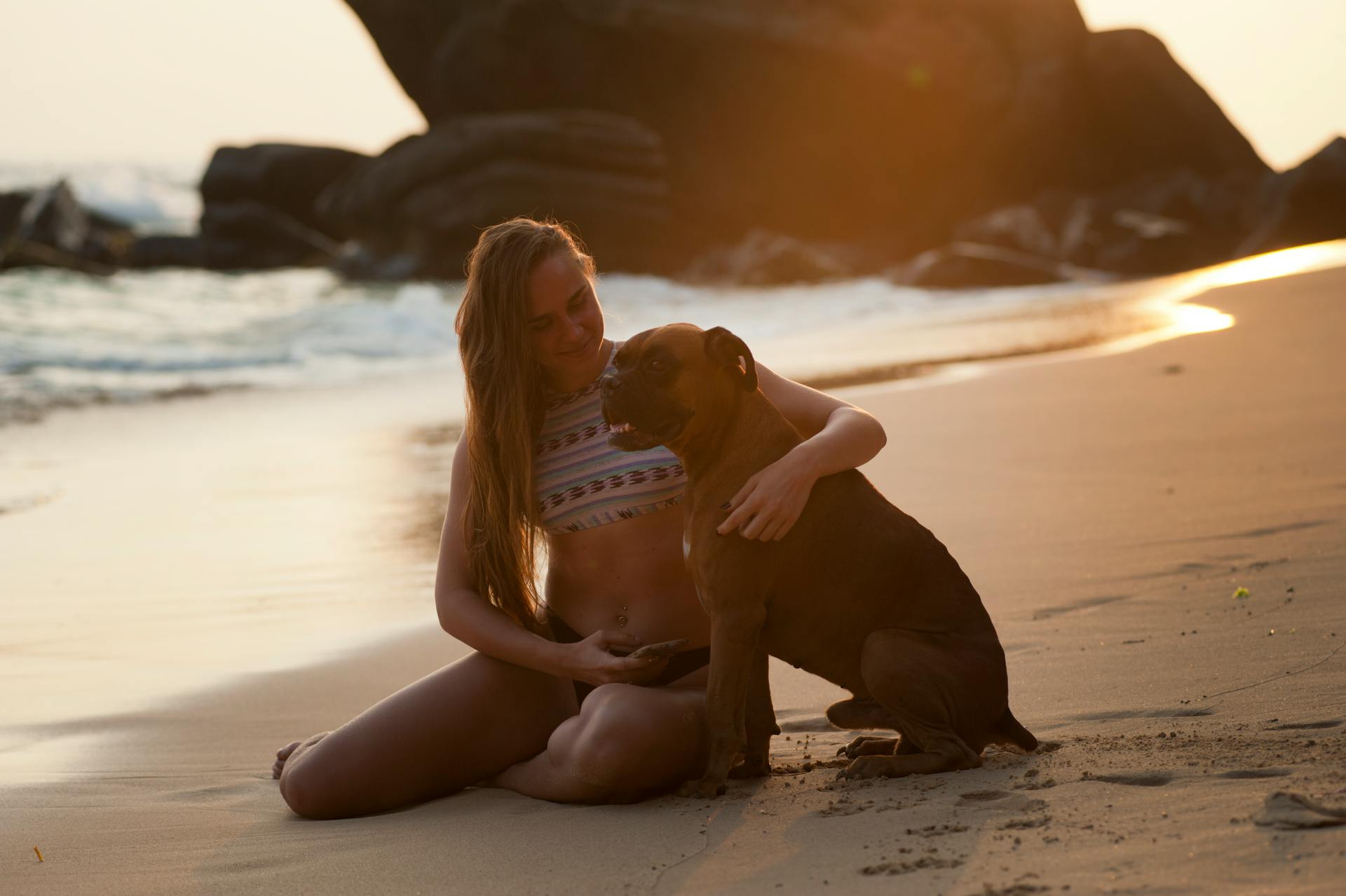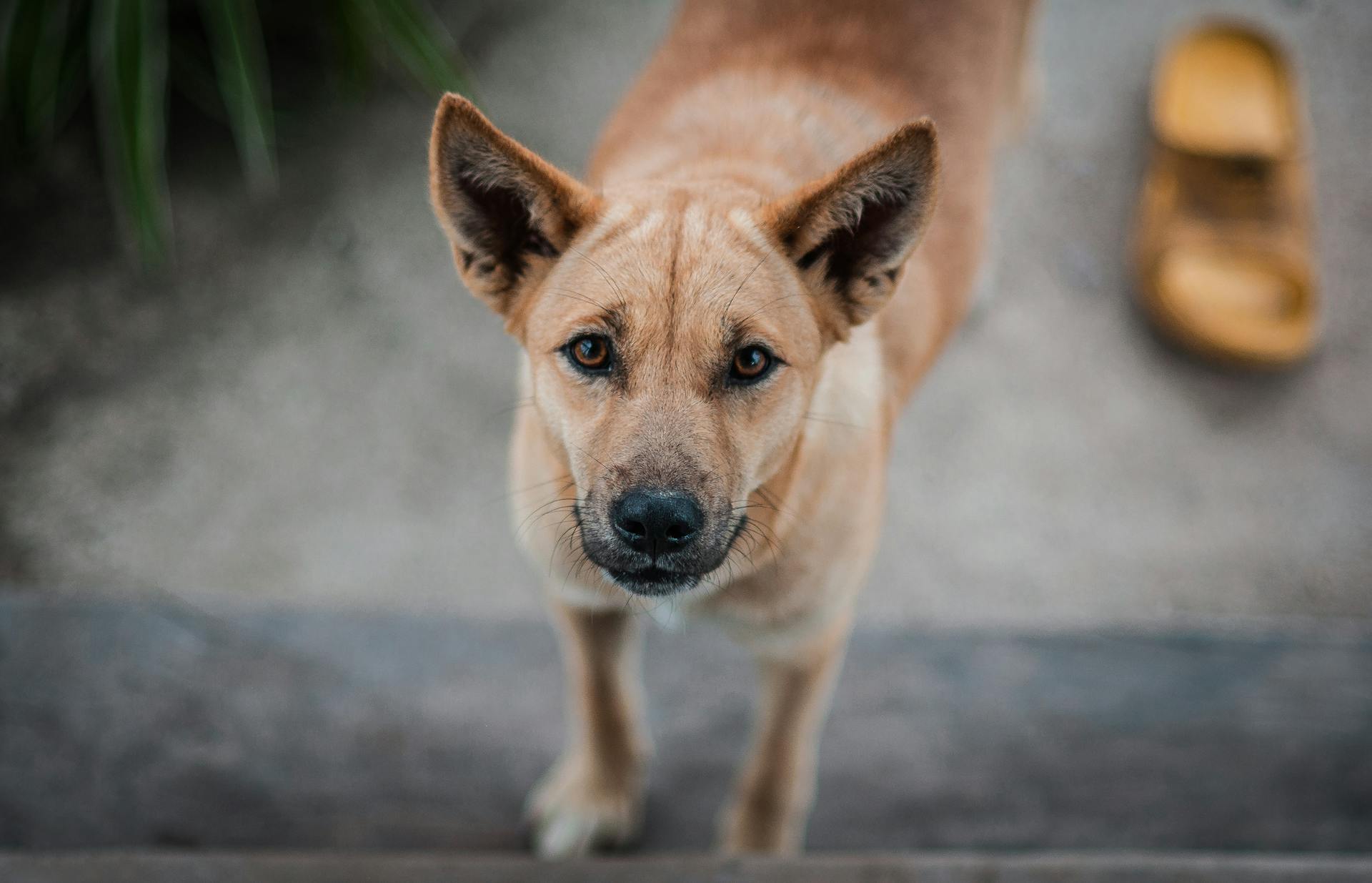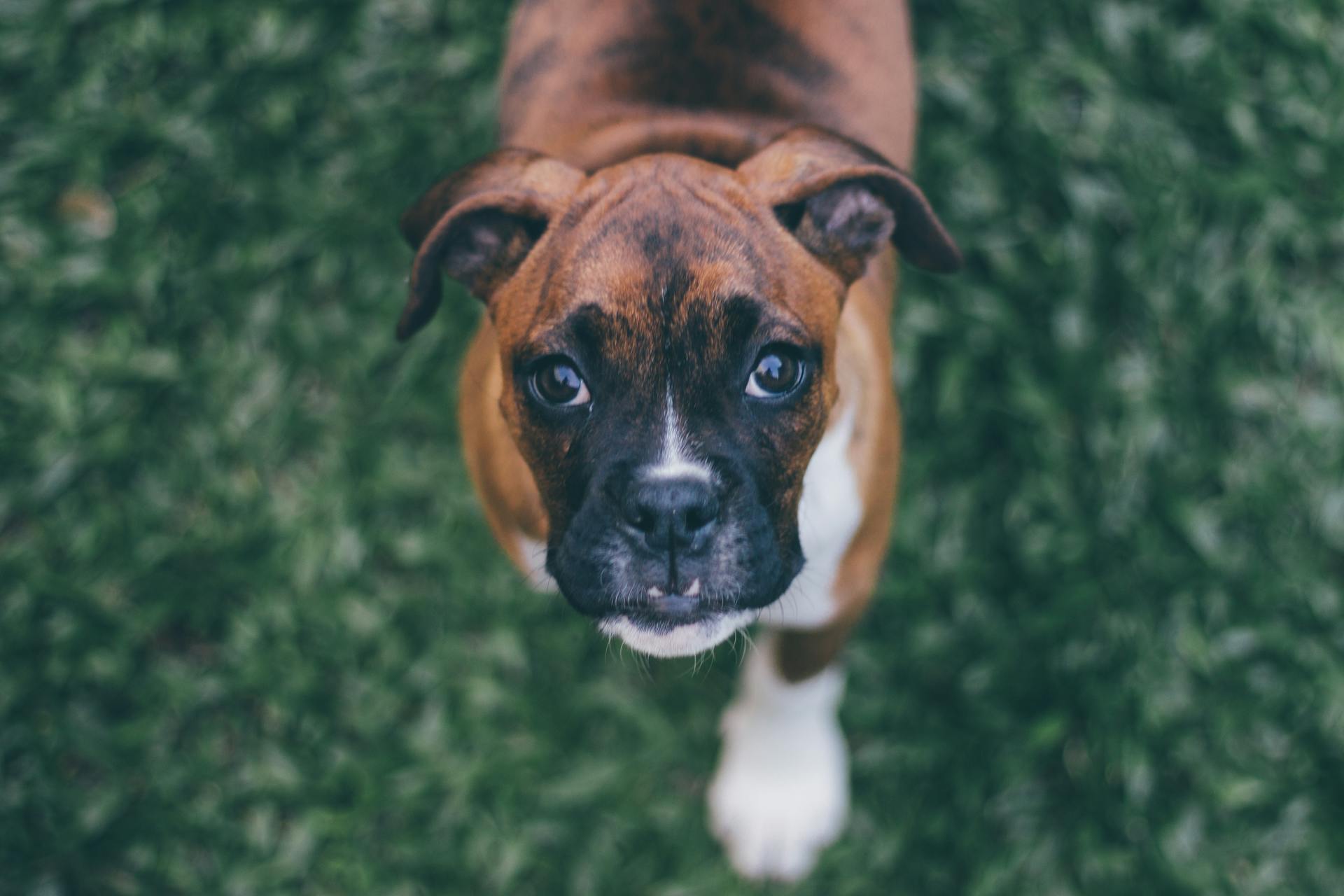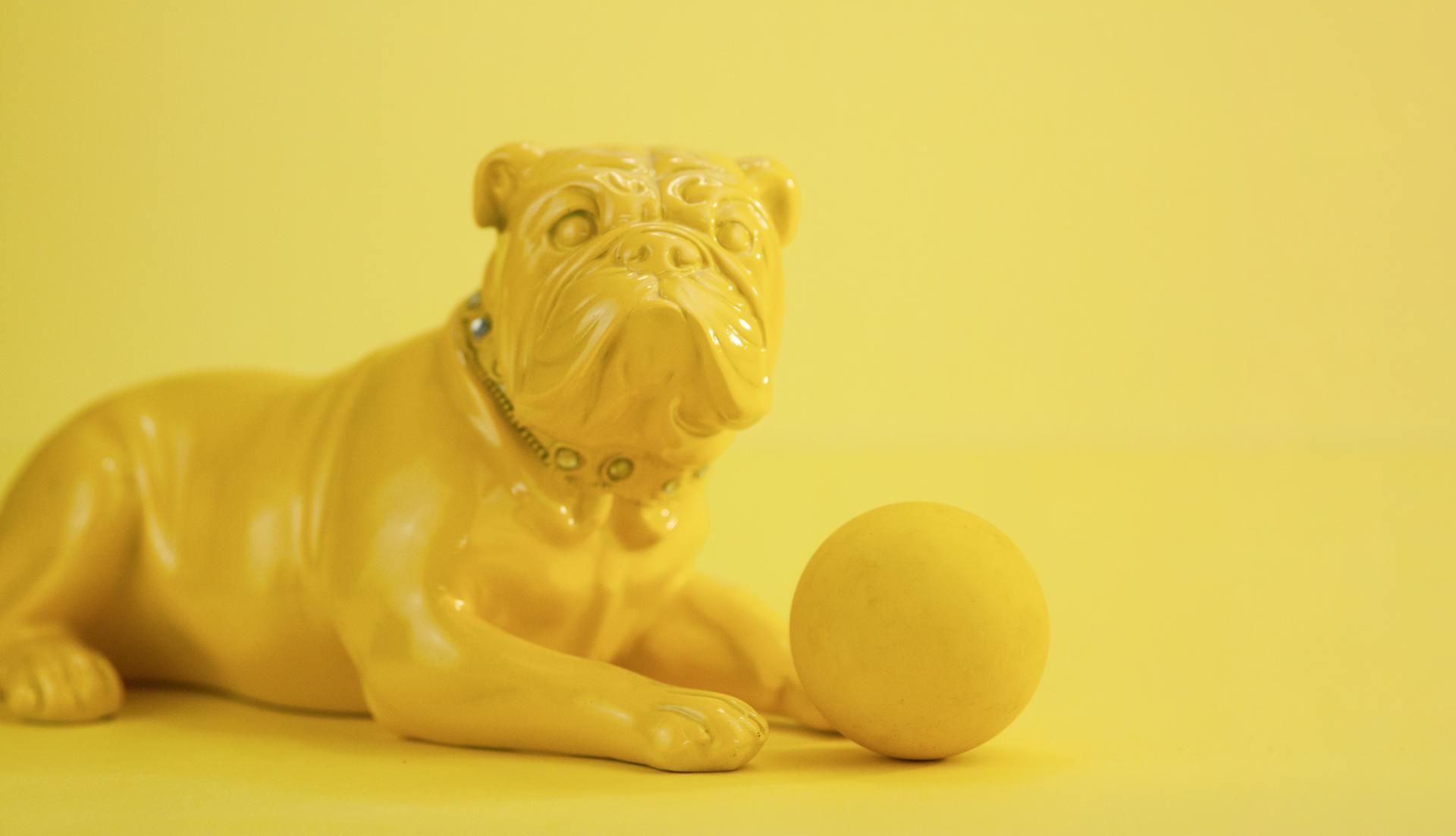
This breed is a cross between a Labrador Retriever and a Boxer, resulting in a unique combination of characteristics.
Their short coats require minimal grooming, making them a great choice for busy owners.
They are generally energetic dogs that need regular exercise to stay happy and healthy.
A daily walk and playtime should be enough to keep them satisfied.
Their intelligence and loyalty make them easy to train, but consistency is key.
With proper training, they can learn to obey commands and behave well in public.
Characteristics
A yellow lab boxer mix can grow up to 23 to 25 inches tall and weigh up to 80 pounds.
Their coat type is a single coat, which is relatively low maintenance. They shed moderately, so you can expect to brush them regularly to prevent matting.
Their eyes can be different colors and are often round in shape. They also have a long nose and short, floppy ears.
This mix is generally friendly, active, and loyal, making them a great companion for families and individuals alike.
They are also extremely playful and energetic, often acting goofy and cheerful. However, they do require regular exercise and attention to prevent boredom and destructive behavior.
If you're considering getting a yellow lab boxer mix, be prepared to spend time with them and provide plenty of playtime and attention. They thrive in large families with active lifestyles.
Here are some key characteristics of the yellow lab boxer mix:
They are not hypoallergenic, so if you or a family member has allergies, this may not be the best breed for you. However, they are great with kids and make excellent family pets.
Overall, a yellow lab boxer mix is a loving and energetic companion that requires regular attention and exercise.
Care and Maintenance
Regular veterinary checkups are essential to detect any health concerns early. Your vet can help you develop a care routine.
Boxadors love to eat, so pick a high-quality dog food and stick to a feeding schedule to prevent rapid weight gain. Two feedings per day could be ideal to keep this pooch happy.
Exercise is crucial for your Boxador, so plan a 30-minute hike, walk, or game of fetch, plus an hour of active running around a yard to burn off pent-up energy.
Daily ear checks are a must, as Boxadors with folded ears may be prone to bacteria and pest infestations, which can lead to ear infections. Clean their ears as recommended by your vet to avoid doctor visits.
Trim your dog's nails before they get too long, usually once or twice per month, to prevent them from clicking against the floor.
Maintaining oral health is a top priority for your Boxador, so brush their teeth a minimum of three times a week, as instructed by your veterinarian.
Clean your dog's eyes as you would your own, using a cloth or your fingers to wipe away discharge or debris that collects in the corners.
Regular grooming and maintenance are essential for your Boxador, depending on their inherited traits from their parents. If they have a weather-resistant coat, they'll require less grooming, while those with less resistant coats will need more.
Additional reading: Husky Mix with Floppy Ears
Shedding will likely occur seasonally in the fall and spring, so brush your Boxador often during these times to prevent excessive shedding.
Keep your Boxador's teeth and nails well-maintained by trimming their nails regularly and brushing their teeth at least three times a week.
Invest in basic grooming equipment, including a comb, brush, deshedder, hair clippers, and nail clippers, before adopting a Boxador.
Your Boxador will have very short hair that's easy to groom and maintain, but if they have dominant Lab genes, expect a lot of shedding, especially during seasonal changes.
Regular bathing is necessary for your Boxador, ideally once every other week, to keep their coat clean and healthy.
Don't forget to check your dog's ears for waxy buildup and dirt once a week and clean them as necessary using a vet-approved ear cleaning solution.
Brushing your Boxador once or twice a week is enough to remove loose hair and dander and keep their coat clean.
Health and Issues
A yellow lab boxer mix can be a wonderful companion, but it's essential to be aware of the potential health issues that can arise. Both Boxer dogs and Labradors can suffer from hip dysplasia due to their larger size.
You'll want to have your puppy checked by a vet as soon as possible to rule out any health conditions. This is crucial, especially if you're adopting from a breeder or shelter.
The good news is that a Boxador is thought of as a relatively healthy breed, but they can still inherit health issues from their parents. This means you should be prepared for potential problems down the line.
Some common health conditions that can affect a Lab Boxer mix include cancer, heart disease, and Boxer Cardiomyopathy, which can cause heart failure and sudden death. It's essential to be aware of these risks and work closely with a veterinarian to prevent or manage them.
Here are some specific health issues that can affect a yellow lab boxer mix:
- Hip dysplasia: This condition occurs when the hip joint doesn't develop properly, causing pain, lameness, and arthritis.
- Allergies: Like people, dogs can develop food or environmental allergies, leading to symptoms like itching, respiratory problems, and skin issues.
- Hypothyroidism: This is a relatively common endocrine problem in dogs caused by an underactive thyroid gland, leading to symptoms like lethargy, weight gain, and skin changes.
Keep in mind that every dog is different, and not all yellow lab boxer mixes will experience these health issues. Regular veterinary check-ups and a healthy lifestyle can go a long way in preventing or managing these problems.
Training Your Dog
Training your yellow lab boxer mix should start early and be done regularly to avoid behavioral problems.
Early training is crucial because it helps your dog learn new tricks quickly and follow commands closely.
You should train your dog in an area with fewer distractions, such as your backyard or home, to prevent him from getting overwhelmed.
Positive reinforcement is key in training your dog, so reward him with treats, praise, or affection when he performs a trick correctly.
Avoid using food treats too much, as this can lead to obesity and overweight issues.
Loud noises, strangers, and other animals can affect your pet's concentration, so train your dog in a quiet area first.
Once your dog is less distracted, you can start training him outdoors.
Some yellow lab boxer mixes might inherit the Boxer's stubborn streak, making training more challenging, but with patience and consistency, they can still learn.
Positive reinforcement training techniques, such as rewarding good behavior and ignoring bad behavior, give the best results and are highly effective.
Early socialization is also essential for your dog to get used to other people, pets, and situations, helping him grow into a friendly and well-rounded dog.
You should expose your dog to many different people, sights, sounds, and experiences from a young age to ensure he develops a well-rounded personality.
With early socialization and training, your yellow lab boxer mix will thrive in an active family with plenty of space to play and exercise.
However, if left alone for too long, they can get bored and develop destructive behavior, so make sure to provide them with plenty of attention and exercise.
Training your dog to be alone should begin early to prevent separation anxiety and destructive behavior.
By following these training tips and providing your dog with plenty of love, attention, and exercise, you'll have a happy and well-behaved yellow lab boxer mix.
Ownership and Responsibility
As the owner of a yellow lab boxer mix, you'll want to ensure you're providing the best possible care and attention to your new furry friend. This breed is loving and loyal to its masters, so be prepared for a strong bond.
Socialization is key when it comes to your lab boxer mix's behavior. Train your dog early to interact with other dogs and people, even if you live alone. This will help prevent behavioral issues and stubbornness during training.
Providing the ideal nutrition, grooming, and health care is crucial for your lab boxer mix's overall health and well-being. With the right care, your dog will grow up to be a loyal, behaved, and healthy companion.
Who Should Own a Dog?
If you're considering bringing a dog into your life, you should think about your lifestyle and whether you can provide the attention and care they need.
Active people and families with children are often a great match for dogs, as they can keep up with the energy and playfulness of their canine companions.
Dogs are social animals that crave companionship, so if you work long hours or travel a lot, it's best to consider a different pet.
Large homes with plenty of space are ideal for dogs that need room to run around and play.
If you're looking for a loyal companion, a dog is a great choice – they'll be by your side through thick and thin.
Buying a Puppy
Buying a puppy can be a daunting task, but with the right approach, you can find a healthy and well-cared-for companion.
First, research reputable breeders before making a decision. A good breeder will provide you with documents about the parents and proof of their breeding to create Lab Boxer puppies.
Make sure to ask about the health conditions and behavioral issues of the parents, as well as the temperament of the dog. This will give you a better understanding of what to expect from your new pet.
If you're looking for a breeder, check out websites like PuppyFind.com, NextDayPets.com, Adopt-a-Pet.com, or Petfinder.com. These sites have ads for Boxer mixed with Lab puppies or dogs.
Lab Boxer puppies can have a variety of coat colors, including black, chocolate, yellow, fawn, brindle, and white markings.
Here are some reputable websites to find Lab Boxer puppies:
- PuppyFind.com (International)
- NextDayPets.com (International)
- Adopt-a-Pet.com (United States)
- Petfinder.com (United States and Canada)
The cost of a Boxer Lab mix puppy can vary, but on average, it's between $350 and $800. However, be prepared to pay more depending on the breeder, your location, lineage, and gender.
Return
As a responsible dog owner, it's essential to consider the return on investment, or rather, the return on love and care, that you'll receive from your Boxer Lab mix.
They can live for 10 to 14 years, given proper care, a balanced diet, and regular veterinary check-ups.
You can expect to spend quality time with your dog, as they love their owners and will always want to please them. Their loyalty and affection are unmatched, making them a great companion for singles and families alike.
Their size can vary, but they generally fall into a medium to large size range, with adult males weighing between 55 to 85 pounds and females typically ranging from 50 to 75 pounds. Their height can range from 21 to 25 inches at the shoulder.
Training your Boxer Lab mix early is crucial to prevent behavioral issues and stubbornness. Socializing them with other dogs and people, even if you live alone, will help them become friendly and sociable pets.
With the right nutrition, grooming, and health care, your Boxer Lab mix will grow up to be a loyal, behaved, and healthy dog.
See what others are reading: How Big Will a Beagle Lab Mix Get
Practical Considerations
If you're considering buying a Lab Boxer mix from a breeder, make sure to purchase from a reputable one. A good breeder will provide you with documents regarding your dog's parents and proof that they were bred to make Lab Boxer puppies.
If you're looking for a breeder, check out reputable websites like PuppyFind.com, NextDayPets.com, Adopt-a-Pet.com, or Petfinder.com, which have ads for Boxer mixed with Lab puppies or dogs.
Be prepared for a mixed breed pup that can have a coat in any combination of the two parent breeds, including black, chocolate, yellow, fawn, or brindle with white markings. A Brindle Boxer Lab dog is very common and these come with white patches.
Explore further: Lab Brindle Mix
Food Requirements
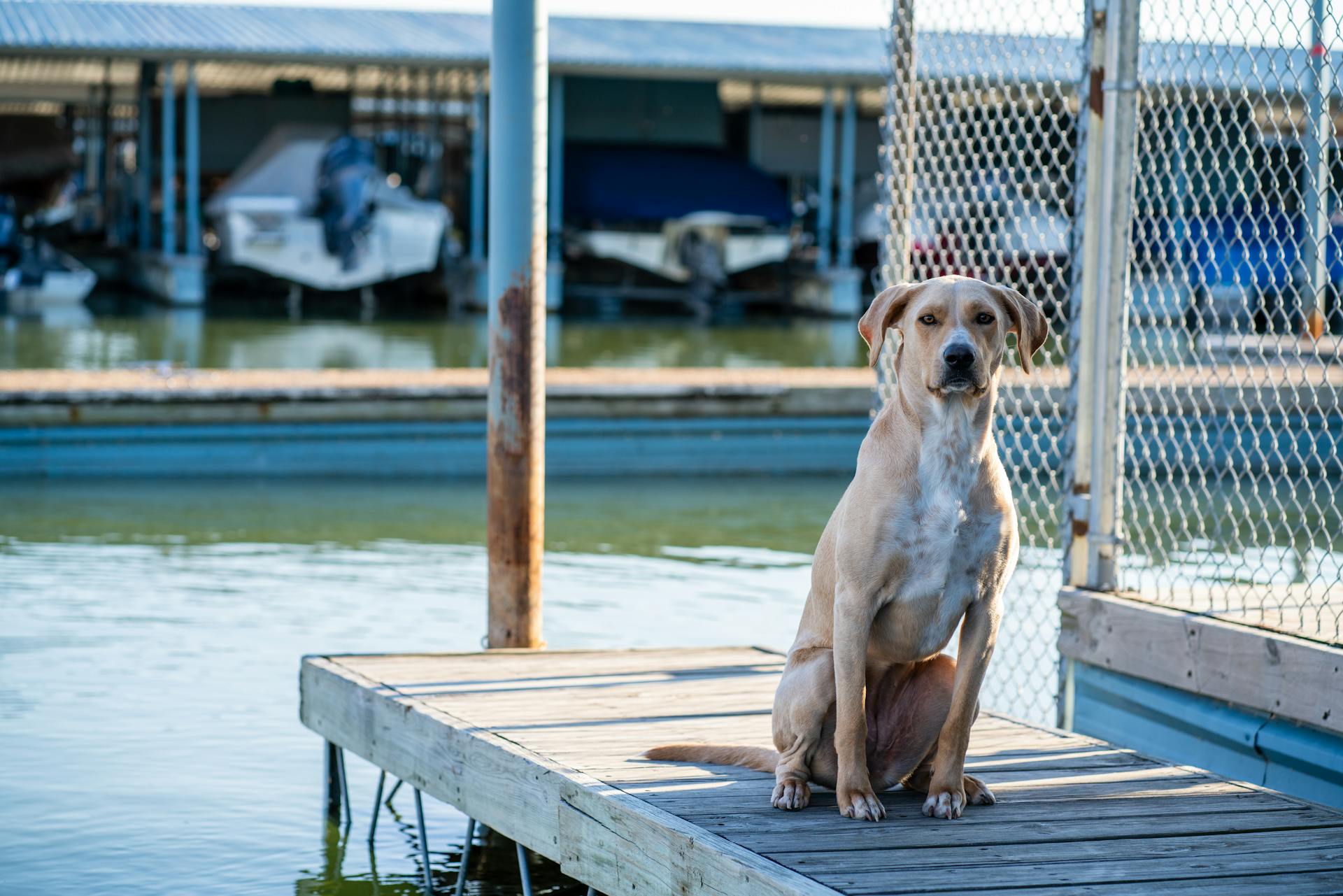
A Boxer Lab mix breed dog is a medium to large dog that needs food packed with protein and carbohydrates to provide enough energy for their daily activities.
Their dietary needs will change from puppyhood to adulthood and will continue to change into their senior years, so it's essential to ask your veterinarian for recommendations about your Boxador's diet.
You should stick to a regular feeding schedule and not leave food out during the day to prevent overeating and weight gain.
A well-balanced diet is crucial for your dog's overall health and vitality, and you can choose from a variety of dog food options that cater to their nutritional needs.
Here are some dog food brands that work well with Boxer Lab mix breeds:
- Canine Formula Taste of the Wild
- Wellness CORE Natural Grain-Free food
These dog food brands offer unique formulas rich in protein and fats, and some are even gluten-free and made with natural ingredients.
Older dogs may require slightly different food, so it's essential to consider their age and health when choosing a dog food.
Avoid giving your dog human food, especially foods that can upset their stomach or be fatal, such as onion and chives, garlic, macadamia nuts, and chocolate.
Exercise Requirements

Boxadors are highly active dogs that require a lot of physical activity to stay happy and healthy. They need at least 60 minutes of good high-energy exercise each day.
You'll want to make sure your Boxador gets a mix of moderate to high-intensity exercise, including long walks, playtime in the yard, and games like hide and seek or tug of war. They also need proper long walks to keep them in shape.
A Boxador's exercise needs can be broken down into two sessions: a morning session and a night session, each lasting at least 30 minutes. This can be a fast walk, a game of frisbee, or other activity that gets your dog breathing heavily.
Lighter exercise throughout the day is also a must, and it's best to let your dog lead the way. This can be a few five-minute sessions of playtime, and it's essential to provide a large, fenced-in backyard for them to run around in.
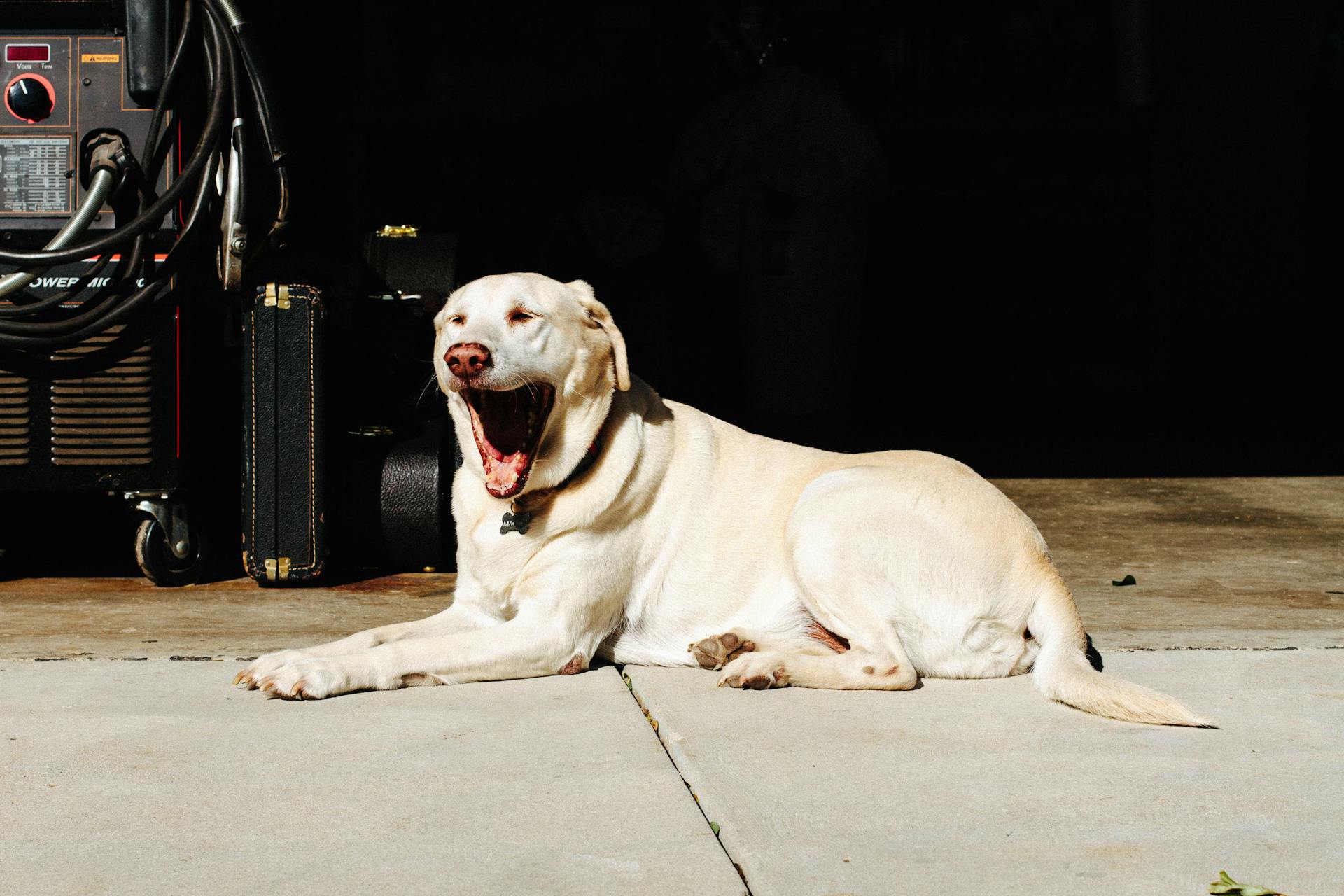
Boxadors are intelligent dogs that require mental stimulation to prevent boredom and hyperactivity. Training your dog is an excellent way to keep their minds busy, and obedience classes are a great way to do this.
You can also use puzzle toys and simple games like hide-and-seek to tire your dog out. These games are an enjoyable way for younger children to bond with the dog, but always remember to supervise.
Size
As a medium to large size dog, Boxadors require plenty of space to run around. Most are between 23 and 25 inches high at the shoulder.
Boxadors can weigh anywhere from 50 to 110 pounds when fully grown. This can impact the amount of food and exercise they need.
Males tend to be larger than females, so keep this in mind if you're considering bringing a Boxador into your family.
Practical Considerations
Purchasing a Boxador puppy can be a significant investment, with prices ranging from $500 to $2,000 for a healthy puppy.
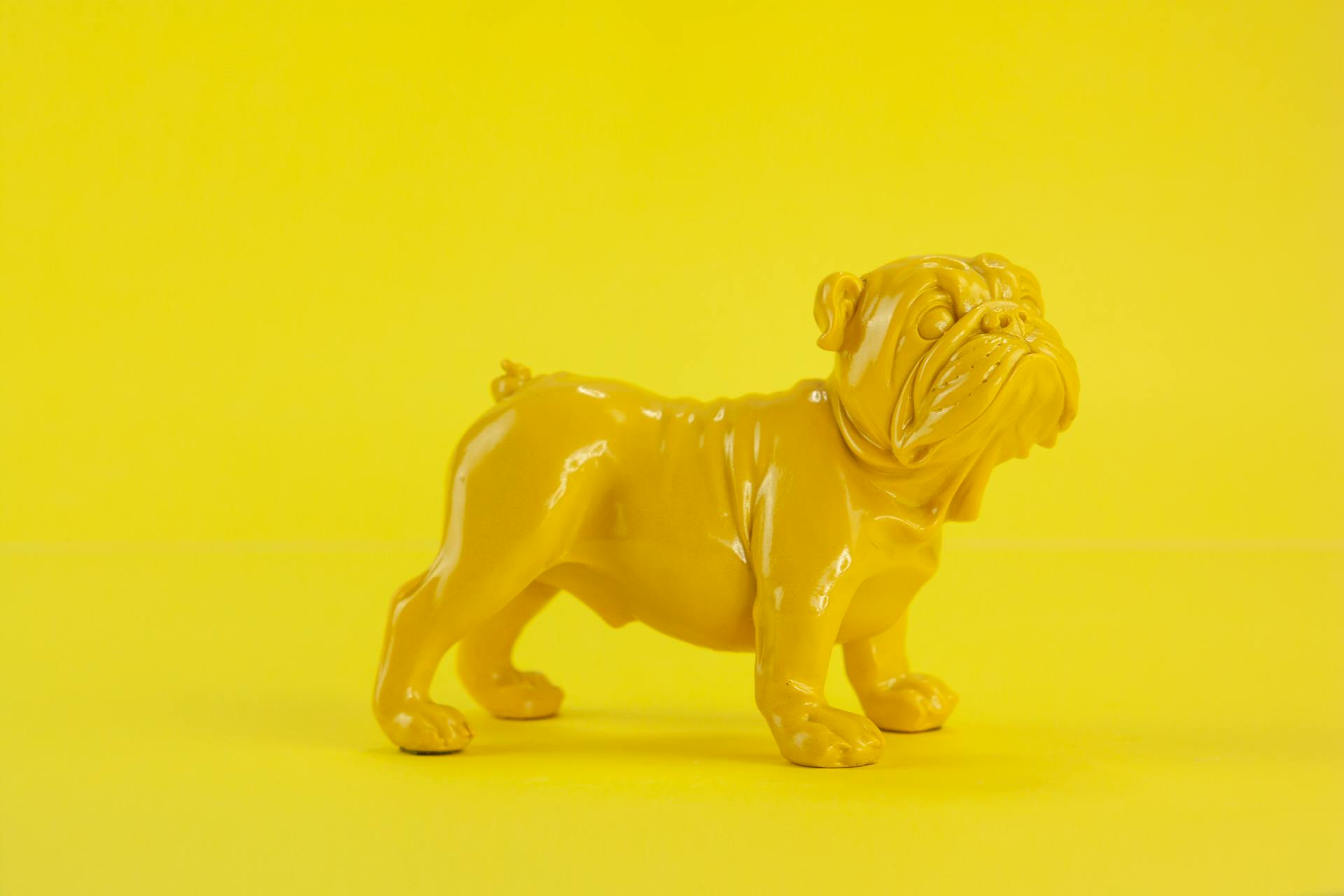
Researching reputable breeders is essential, as they can provide health certificates for both parents and puppies. A good breeder will also be transparent about the conditions the puppies are kept in.
You can expect to pay between $350 and $800 for a Boxer Lab mix puppy from a reputable breeder, although prices may vary depending on several factors.
If you're considering adopting a rescue dog, you can check with your veterinarian or other pet owners for local rescue groups. Adopting a rescue animal can be a wonderful way to save a life and ease the burden on overcrowded shelters.
Here are some reputable websites to find Boxer mixed with Lab puppies or dogs for sale:
- PuppyFind.com (International)
- NextDayPets.com (International)
- Adopt-a-Pet.com (United States)
- Petfinder.com (United States and Canada)
Frequently Asked Questions
Are Boxer Lab Mix good dogs?
Boxer Lab Mixes are energetic and loving companions suitable for active families, but may not be the best fit for those seeking low-maintenance pets. They require regular exercise to thrive and bring joy to their owners.
What is the temperament of a Boxador?
The Boxador is an affectionate, loyal, and highly intelligent dog that thrives on family interaction and adventure. She requires regular exercise and mental stimulation to keep her busy and happy.
What is the lifespan of a Boxador female dog?
A Boxador female dog typically lives for 12 to 15 years with proper care and socialization.
What is a Labrador Boxer called?
The Labrador Boxer mix is commonly known as a Boxador, Laboxer, Boxerlab, or Boxerdor. This versatile breed combines the best qualities of its parent breeds.
Featured Images: pexels.com
